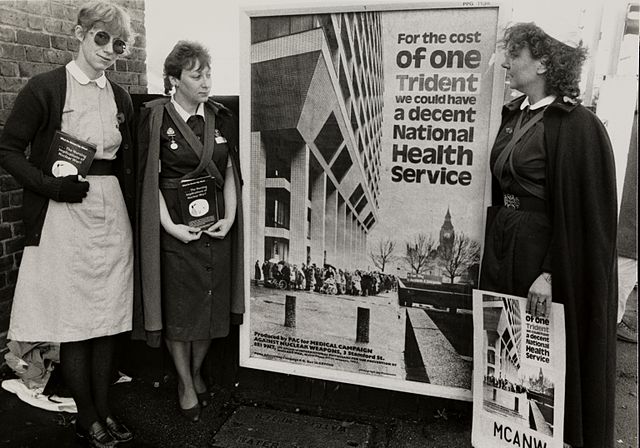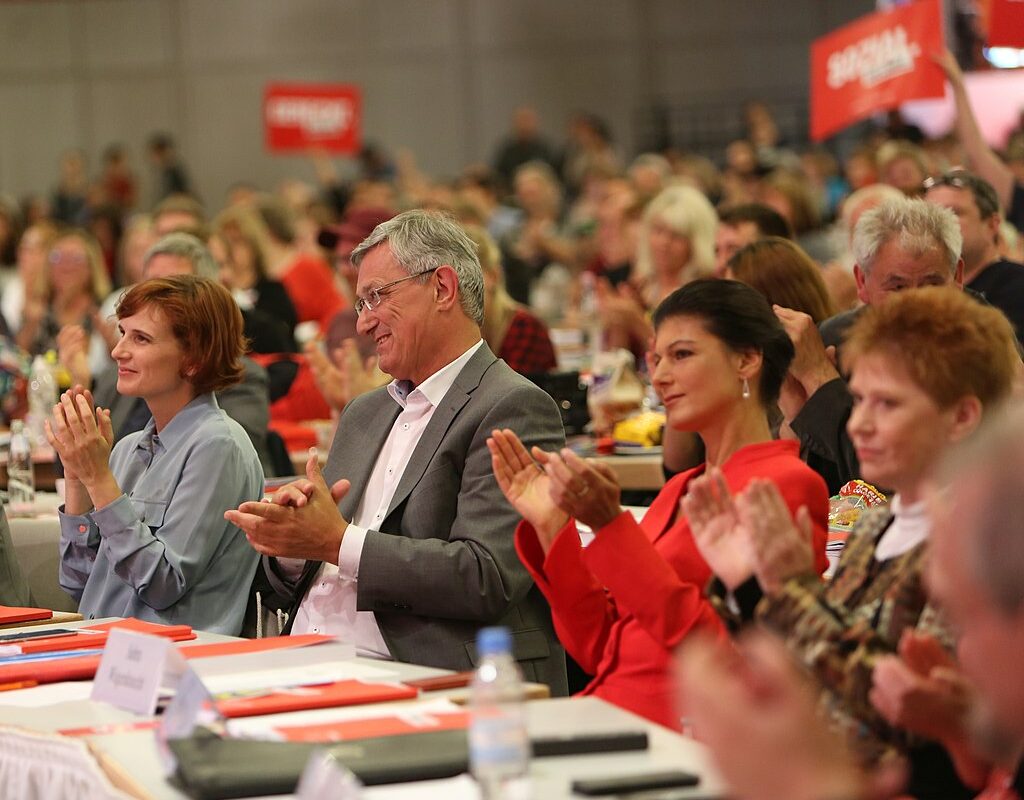Shadow Health Secretary Wes Streeting has no doubt that greater investment in the private sector by utilising its ‘spare capacity’ will help ever lengthening NHS waiting lists. He presents this policy as a progressive measure to help working people. The argument is that any who oppose such a plan simply wish for ideological reasons – to deny poor people access to the private health care that they themselves enjoy. Streeting enthusiastically repeats Nigel Lawson’s derogatory characterisation of the NHS as a ‘religion’, implying that ‘liberals’ view it as beyond criticism and it defies rational understanding.
The total number of NHS hospital beds in England has more than halved over the past 30 years, from around 299,000 in 1987/88 to 141,000 in 2019/20. However, the private sector remains much smaller with 8,900 beds, and relies almost entirely on senior doctors who already work for the NHS. Claims of “spare capacity” in the private care sector are common and made to appear as self-evidently true. But as one private health care website puts it: ‘facts and figures about the private health sector in the UK are surprisingly hard to come by’.
A recent article in the British Medical Journal (BMJ) called for private providers to be required to report the same data as NHS hospitals. We just do not have the information (on private sector workforce, hospital capacity, outpatient services, and prices required) to understand the effects of boosting private sector activity on the healthcare workforce, demand for services, and healthcare quality. The paper argued that this information is crucial to policy making because the NHS and the private sector both fish in the same limited pool for health care staff. If you expand work and staff in one, the other will suffer.
NHS-funded work in the private sector continues to increase. Almost 10% of elective procedures such as hip and knee operations were outsourced to the private sector in 2023, up 50% from pre-covid levels. Staffing problems and pressure to reduce the 7.6 million care backlog increasingly force health service trusts to send patients on their waiting lists to private providers. To put this in another way, government failure to invest in NHS staff and facilities drives the growth of the private sector.
Why policy makers should be cautious
Recent experiences of using the private sector to ‘help’ the NHS should make any rational policy maker cautious. For example, during Covid there was the disastrous privatised ‘Test and Trace’ system; the unusable PPE scandal; and the contract with private hospitals for providing additional capacity. However the contract meant the private sector portion of patients from the NHS, actually went down by 43%, while numbers of fee-paying private patients increased. Moreover no more than one private hospital bed was occupied by a Covid infected patient during 59% of the contract. All these examples underline that by their nature private providers in general are profit maximisers rather than ‘helpers’ or cost minimisers for the NHS.
Demand for private health care other than from the NHS is far from booming, despite the industry statements. Even the numbers of NHS consultants engaging in some private practice has fallen, going from 16,000 in 2000 to 9000 in 2023. No wonder the sector is keen to offer ‘help’ to the NHS in return for a guaranteed income. It is no surprise to see a Conservative prime minister reflexively turning to the private sector for an NHS recovery plan. But when Labour does the same it suggests heavy lobbying and a failure to critically examine evidence. Other possible explanations are incompetence, or an ideological aversion to the NHS.
What does ‘spare capacity’ actually mean?
The bosses and cheerleaders for the private sector usually like to present it as “lean and efficient” in contrast to the “plodding and wasteful” public sector NHS. We are expected to believe that the private sector has ‘spare capacity’ with staff sitting twiddling thumbs in empty facilities, just waiting to be called upon. If this is true, this waste of resources tells us that the private sector is not such a well-run business model after all. What ‘spare capacity’ really means is that when guaranteed an income stream by the NHS, the private sector can rapidly increase capacity for certain health conditions deemed profitable. Some suggest increased use of private providers is temporary until waiting lists fall. But it seems unlikely that such contracts would be commercially attractive and probable that the NHS would find itself locked in for a longer period.
This played out in ophthalmology, where the majority of cataract surgery is now performed in the private sector and paid for by the NHS. Waiting lists may have been brought down but at the same time the outsourcing has undermined NHS services. Cataracts are the bread and butter for eye surgeons in training, but are now done in private clinics . They are no longer available for junior surgeons to learn their craft. Nurses attracted by better pay leave the NHS. Consultant surgeons and anaesthetists who would have been working in the NHS now opt to work some of their time in better paid private clinics. These also weed out complex (and costly) cases and leave these to the NHS.
‘Supplier induced demand’ undermines NHS services
The threshold for offering an operation has been reduced. Hence the numbers of operations has risen (termed ‘supplier induced demand’). Since the NHS now pays for this increased volume of cataract operations, it then has less money left to deal with complex conditions. Such as those causing blindness (e.g. glaucoma, macular degeneration, retinopathy) which the private sector rejects. Since the vast majority of consultants engaging in private work are almost always employed by the NHS, they must adapt their NHS work plans but always adapt their work plans to make time to work in the private sector where they are employed on a freelance basis. They inevitably spend less time in the NHS. Team work and training are undermined.
The Centre for Health and the Public Interest (CHPI) found that the percentage of NHS cataracts delivered by the private sector increased from 24% in 2018/19 to 55% in 2022/23. The proportion of the total NHS budget for ophthalmology spent on cataract services has increased from 27% to 36% while 78 new private for-profit clinics have been opened over the past five years. Over this time, surgery for ‘complex cataracts’ has increased by 144%, by the NHS. This increase is almost all in the for-profit-sector – despite its’ policy of screening out complex patients and leaving these to the NHS. This means that simple cases are being wrongly reported as complex in order to charge more to the NHS. There is some worrying but predictable evidence that waiting times for assessment of conditions causing preventable sight loss have increased.
What do the experts think?
A Health Foundation report pointed out that it is relatively easy for the private sector to scale up provision for simple high volume procedures like cataract surgery, but less so for other procedures such as in orthopaedics. For example, for hip replacements, an increased number were carried out in private hospitals – as the number declined in NHS. That left total numbers unchanged, but much more cash flowed out of the NHS into private pockets. The Health Foundation report concluded that the private sector would play only a limited role in fully recovering services and cannot substitute for addressing the major problems facing the NHS. The King’s Fund examined strategies used in the past for successfully reducing waiting lists for non-urgent care, and concluded that increasing funding and NHS workforce capacity both played a key role.
The Nuffield Trust observed that more spending on the private sector meant more competition for consultant time and outsourced services like imaging. This made it harder to expand care paid for by the health service. Private services do not have emergency and intensive care services and are located in wealthier areas. This favours white and more affluent patients and is less likely to be able to provide care to sicker people in poorer areas.
The NHS Confederation represents health service managers, and stated that the private sector does not have the capabilities, workforce or capital to take on the more complex and urgent cases left to the NHS. Many trust bosses (NHS Providers) are sceptical about private providers, pointing out that access is not uniform across the country and emphasising the potential to increase health inequalities.
Dismissing objections to use of the private sector as simply ideological is disingenuous
David Rowland, Director of CHPI, highlighted the concerns about Streeting’s plans in an opinion piece in the Guardian. Nearly all the doctors working in the private sector do it on a part time basis and work for the NHS the rest of the time. The main blockage on clearing the NHS backlog is not a lack of operating theatres but a lack of consultant surgeon and anaesthetist time. There is only one pool of such healthcare professionals in the UK. Unless that pool expands significantly and quickly, pushing patients into the private sector will have little impact on the overall waiting list.
Real risks for patient safety
Pushing patients to the private sector will however, expose patients to greater risk. This has been shown in many reports and inquiries including a recent Panorama programme focusing on deaths. These risks are because private hospitals are small, lack intensive care facilities, and have poor medical cover at night.
In reality, it is the NHS that ‘helps’ private hospitals, by providing trained staff. Training costs borne by the NHS are estimated at around £8 billion. In addition, there are also around 6,600 patients that have to be transferred to NHS facilities from the private sector each year at an estimated cost of £80 million. Despite the scandal surrounding the breast surgeon Ian Paterson needlessly operating privately on women, neither the Government nor the private sector have implemented the recommendations of the subsequent inquiry. Currently the NHS is treated as a ‘safety net’ by the private sector, and left to pick up the pieces and the costs when private treatment fails or if private providers carrying out NHS work collapse.
Conclusions
The long-term problems facing the NHS are the lack of capacity from chronic understaffing and underfunding to balance current demand. No amount of ‘reform’ will solve these issues without significant investment. This was was demonstrated under the Blair-Brown government. Previous experiments by Labour in using the private sector through Independent Sector Treatment Centres increased costs while undermining NHS services and contributing little in the way of greater capacity.
The key flaw in Labour’s plans to use ‘spare capacity’ is that the private sector depends on staff who already work in the NHS. If they spend more time working for private providers, they spend less time in the NHS. The impact on waiting lists of ‘holding the door open’ for the private sector is marginal at best. But increasing reliance on the private sector will undoubtedly undermine NHS services as has been clearly demonstrated recently in ophthalmology. Given the distribution of private facilities, such a policy will increase health inequity with white and better off patients being the most likely beneficiaries, while exposing some patients to increased risk.
Growth of the private sector is not simply due to market forces. It is the product of government policy over the past two decades. Any government can, if they choose, reverse this trend by sustained investment in the NHS and removing subsidies which promote the growth of for-profit care in the UK. Labour must have a radical re-think of its policies. Alternatively it must share the evidence for its’ claims that investing in the private sector helps the NHS.
The current situation is sufficiently serious for the next government to declare a national health emergency. Then, a policy option to seriously consider would be to requisition any real spare capacity in private health care facilities and use it for the benefit of patients. Much better is for Labour to commit to investing in rebuilding a strong NHS based on its founding principles.



